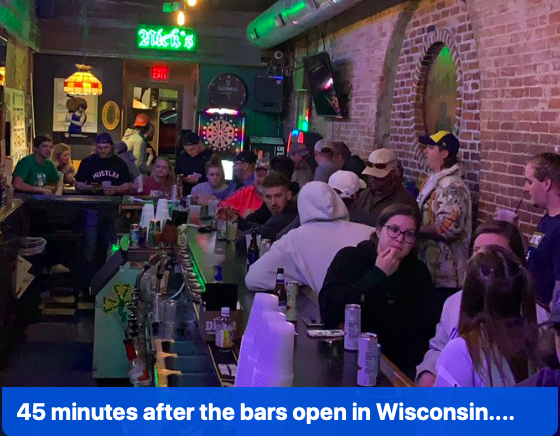Ira Lacher: “For better, or God forbid, much worse, America has decided on a path: Reopen, urge common-sense caution, and come what may.” -promoted by Laura Belin
My friend’s daughter caught COVID-19. Experiencing high fever and labored breathing, she visited an emergency room of a New York City hospital, where she spent several days in intensive care, before finally being allowed to go home, where milder symptoms continued for weeks. But physical symptoms gave way to mental health symptoms, specifically, severe panic. Those same symptoms have befallen her father, hundreds of miles away from her.
The effects of the pandemic have been duly reported: physical symptoms, sometimes leading to death; economic symptoms, careering the world toward financial collapse; societal symptoms, including increasing disregard for civil authority. Now, the United Nations is adding another effect: mental health symptoms.
Last week, the United Nations warned of increases in anxiety, depression, anger, and suicide resulting from increased fear, grief, and hopelessness over the pandemic. In its introduction, UN Secretary-General Antonio Gutierrez said: “The COVID-19 virus is not only attacking our physical health; it is also increasing psychological suffering: grief at the loss of loved ones, shock at the loss of jobs, isolation, and restriction on movement, difficult family dynamics, uncertainty, and fear for the future.”
The report was issued as states and nations begin relaxing lockdown policies, intended to reduce the spread of infection and avoid overtaxing health facilities. Many businesses are being allowed to reopen around the world — much to the consternation of public health experts, who warn of dire consequences.
But Ryan McMaken, a former Colorado economist, argued there are dire consequences of staying shut. Writing in The Hill, McMaken said, “the initial shock and panic that came with the spread of COVID-19 will … be replaced by concerns over bankrupt states, disappearing city services (possibly including even law enforcement), unemployment and missed rent.”
Despite what some insist, the debate is not as simple as the economy vs. public health, or profits over people. It is about whether we acknowledge the reality of 21st-century society and of human nature.
In outlining plans for Iowa’s easing shutdowns, Gov. Kim Reynolds stressed she did not “rip the Band-Aid off or flip a light switch.” As The Des Moines Register reported, “we’re being very methodical in the way that we move forward,” she said.
Predictably, most public health experts have blasted the notion of reopening too soon. But not all. University of Minnesota epidemiology professor Kumi Smith acknowledged that people are hitting what she called “pandemic fatigue.” She told The Register, “We realize that a stay-at-home order that has no end is not tenable socially, mentally or economically … .”
And if infections skyrocket, as nearly every public health expert warns?
“I really believe that once America opens up, it’ll be very hard for America to ever lock down again,” White house czar-of-everything Jared Kushner told TIME magazine. Kushner may be a hopelessly ignorant, tin-plated beneficiary of criminal nepotism. But even incompetents with delusions of godhood can be right every so often.
For better, or God forbid, much worse, America has decided on a path: Reopen, urge common-sense caution, and come what may. Detractors have equated this to sentencing to death hundreds of thousands of the most vulnerable — the poor, elderly, brown, black, and unhealthy. (It is, as I have suggested, very much a eugenics approach.) Critics say this proves that in America, all lives don’t matter.
But none of that changes reality. America is not a country where everyone can feel confident that in any emergency no one will go hungry or homeless, be penalized for declining dangerous work, lose a business or livelihood, or grow old in fear. Where we can all work from home, watch Netflix, and do jigsaw puzzles without worrying about the bills and the rent.
So, reluctantly, we will shove off on a course between Scylla and Charybdis: the ravings of a lunatic president who insists the virus will disappear like fairy dust, and the dire warnings of public health experts who fear the worst. We will wear masks, maintain physical distancing, stay home when sick, and do everything else to avoid getting a virulently communicable disease with often serious consequences.
To do otherwise is to countenance tens of millions of people starving and homeless, defy our nature as a social species and allow many, many more people, like my friend and his daughter, to slip into the clutches of terrible mental strain.
Top photo: Cropped from a photo that Nick’s Bar posted on Twitter the same day the Wisconsin Supreme Court invalidated the Democratic governor’s stay-at-home order.


1 Comment
Small clarification
“We will wear masks, maintain physical distancing, stay home when sick, and do everything else to avoid getting a virulently communicable disease with often serious consequences.”
Some of us will definitely do that. But I saw ample evidence just today that some of us won’t.
PrairieFan Mon 18 May 2:55 AM